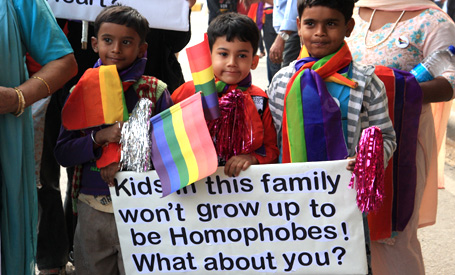An estimated 1,500 people attended the 4th annual Delhi Queer Pride March on Nov 27, according to organisers.
In a bilingual English and Hindi leaflet handed to participants and onlookers, organisers said: “Just as we have many reasons to cheer, we also have many reasons to be sad, upset and infuriated! Despite the fabulous judgment of the Delhi High Court reading down section 377 of the IPC, queer people in India face violence and discrimination from many different quarters on a daily basis. Lesbians are subjected to violence, forced into marriages, driven to commit suicide by their families. Gay men are blackmailed, often with the support of the police. Hijras regularly bear the brunt of brutal violence meted out to them by the police and others in public and private. Trans people do not have the medical and psychological services that they need. These are but a few examples.”
It further called on the government to address issues relating to violence perpetuated by the police and within the family against LGBTIs (lesbian, gay, bisexual, transgender and intersex); enact anti-discrimination laws to protect LGBTIs persons at state and privately run institutions; allow people to record the gender category of their choice in all government documents; and provide sex education and counseling facilities in schools for LGBTI youth and parents of LGBTI persons.
As in previous years, masks and rainbow coloured scarves were distributed to attendees who did not want to be recognised or recorded by the media which was out in full force. What was particularly telling of the anxieties some people have about being thought to be gay were the numerous masked onlookers who were standing on the sidewalks quietly observing the parade that began at Barakhamba Road-Tolstoy Marg.
Organised and funded by the Delhi Queer Pride Committee and LGBT community, the carnival-like parade where marchers danced to the beat of drums was escorted by more than a dozen Delhi Police officers along the parade route.
The march ended in Jantar Mantar at nightfall where organisers read a "Charter of Demands for LGBT Rights" and the crowd observed two minutes of silence for those who died in the recent Nand Nagri fire tragedy in which at least 18 persons are reported to have died and over 30 injured during a transgender meet in the Indian capital.
On the same night, New York-based South Asian-focused transnational arts and human rights festival, Engendered, staged 'Rock For Rights' – its inaugural event in the country – in collaboration with local gay group Queer Delhi. The event, which was held at the upscale Lalit Hotel, saw the likes of prominent stars Rekha Bhardwaj, Suman Sridhar of electropop duo Sridhar/Thayil, and Mumbai-based folk-rock artist Alisha Batth perform and voice their support for equal rights for LGBTs.
"I am excited to add my voice for Rock For Rights, and the cause of equal human rights for everyone, and a life of dignity, choice and freedom irrespective of personal choices or gender identity," Bhardwaj was quoted as saying in the Indian Today newspaper.
On July 2 2009, the New Delhi High Court decriminalised same-sex sexual relations between consenting adults, by reading down section 377 of the Indian Penal Code. The Supreme Court is expected to hear a set of petitions filed by political, social and religious organisations who have opposed the Delhi High Court verdict decriminalising homosexual behaviour in February next year.
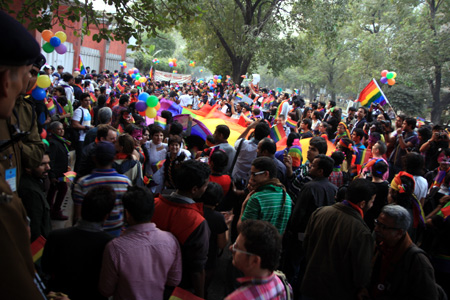
The parade that moved from Barakhamba Road-Tolstoy Marg to Jantar Mantar
caused traffic to slow down as passers-by and motorists stopped to watch the
colourful parade. All photos by Sylvia Tan
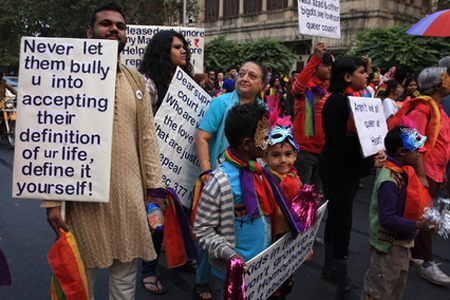
Left: 22-year-old university student Sambhav K Sharma, who was at the
parade with his grandmother and seven other family members in tow,
told Fridae: "The reason I'm here is because of my grandmother and I want
to tell my story to the media. My family embraces me (as a gay man). Things
have changed since the Delhi High Court judgment in 2009 but I want to
see it fully repealed for the sake of my future."
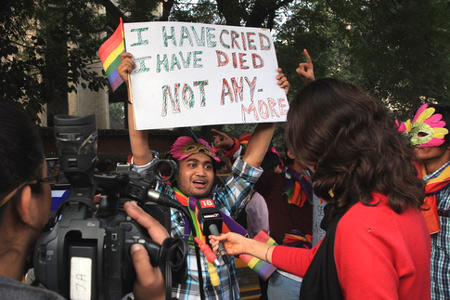
Organisers hope to draw awareness to the challenges LGBTI people
in India face including violence and discrimination from "many different
quarters on a daily basis."
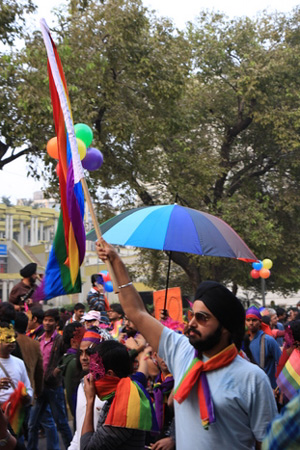
A Sikh man waving the rainbow flag. Sikhism is known to not have
specific teachings about homosexuality.
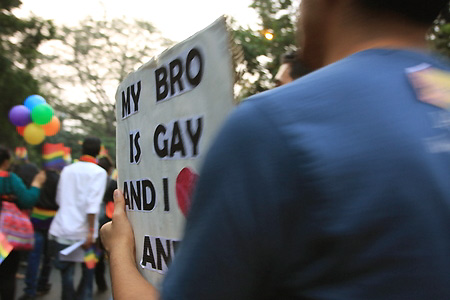
A young man with a placard that reads: "My bro(ther) is gay and
I love and support him."

